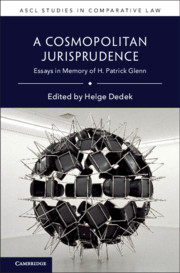Book contents
- A Cosmopolitan Jurisprudence
- ASCL Studies in Comparative Law
- A Cosmopolitan Jurisprudence
- Copyright page
- Epigraph
- Contents
- Foreword
- Acknowledgements
- Notes on Contributors
- Images
- Introduction
- Part I The Tradition of Comparative Law
- Part II The Concept of Tradition
- 6 Too Much Information
- 7 Legal Systems as Legal Traditions
- 8 Learning from Patrick Glenn: Tradition, Change, and Innovation
- 9 The Sunni Legal Tradition: An Overview of Pluralism, Formalism, and Reform
- 10 Commensurability, Comparative Law, and Confucian Legal Tradition
- Part III Crossing Boundaries
- H Patrick Glenn Publications
- Index
10 - Commensurability, Comparative Law, and Confucian Legal Tradition
from Part II - The Concept of Tradition
Published online by Cambridge University Press: 10 December 2021
- A Cosmopolitan Jurisprudence
- ASCL Studies in Comparative Law
- A Cosmopolitan Jurisprudence
- Copyright page
- Epigraph
- Contents
- Foreword
- Acknowledgements
- Notes on Contributors
- Images
- Introduction
- Part I The Tradition of Comparative Law
- Part II The Concept of Tradition
- 6 Too Much Information
- 7 Legal Systems as Legal Traditions
- 8 Learning from Patrick Glenn: Tradition, Change, and Innovation
- 9 The Sunni Legal Tradition: An Overview of Pluralism, Formalism, and Reform
- 10 Commensurability, Comparative Law, and Confucian Legal Tradition
- Part III Crossing Boundaries
- H Patrick Glenn Publications
- Index
Summary
Are legal traditions incommensurable? Professor H. Patrick Glenn argued that the idea that legal traditions were not suitable for comparison was a result of the reification of cultures. This chapter discusses Glenn’s insights of tradition and commensurability by examining the variants of the concepts and practices of lineage property in historical Confucianism. In the Confucian sphere of influence, marked by the shared precept of ancestral worship and primacy of ritual obligation, legal developments concerning lineage organization and property converged and diverged, revealing the complexity in humanity’s efforts to respond to the various challenges it faced. This examination illustrates Glenn’s central idea that legal traditions of the world are not only comparable and translatable but also transplantable. Transformation and transmission of law in East Asia underscore the need to compare legal traditions, both within and without in all its independence and interdependence, and further to understand the past in its own terms in all the interconnectedness of autonomous dimensions of life at a given time.
Keywords
- Type
- Chapter
- Information
- A Cosmopolitan JurisprudenceEssays in Memory of H. Patrick Glenn, pp. 202 - 220Publisher: Cambridge University PressPrint publication year: 2021



